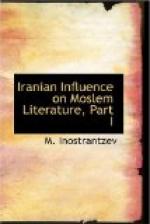2. The second book in the Fihrist is attributed to a Mobedan-mobed that is, head of the Parsi clergy, who in Arabic texts is sometimes called simply Al-Mobedan and whose name was not understood by Flugel[1]. The same word is met with in a mutilated form in another place in the Fihrist[2]. (119-20).
[Footnote 1: Fugel took it for a dual, and consequently divided the name into two.]
[Footnote 2: The book next following is called Kitab kay Lorasp and apparently it had to do with questions connected with Persian literary tradition.]
He is mentioned by Ali Ibn Rayhani, Arabic author, who stood in near relationship to the Khalif and who was partial to the Zindiks, that is, in this case, to the Dualists. He is a reputed author of several books among which there is one whose title was restored by Justi in the Namenbuch[1]. The conjecture of Justi that this name should be read Mihr Adar Jushnas is fully supported by a sketch of it in a passage of interest to us in the Fihrist. Justi hesitated to declare whether this was the name of the book or of its author. But in another place in the text this word is accompanied by the designation Al-Mobedan from which we can undoubtedly conclude that this book was ascribed to a particular person, the supreme Mobed Mihr Adar Jushnas. Therefore, this title of the book should be read as that of the book of Mihr Adar Jushnas, the Mobedan. This book stands at the head of the works we are considering in the Fihrist. Therefore, we can fully trace it to the Persian literary tradition.
[Footnote 1: Namenbuch Mahr Adar Jushnes.]
3. Similarly there can be no scepticism regarding the individual nature of the book called the Book of the Testament of Khusro to his son Ormuz, the admonition given to the latter when he handed over to him the reins of government and the reply of Ormuz. Flugel already perfectly correctly noticed that by Kisra we must here understand Kisra Anushirvan. In this way in this book or in the first half of it we have certainly the Andarz Khusro, the celebrated work in the Pahlavi literature which has been preserved up to our times and which has been translated into the European languages.[1] It contains a number of counsels of Khusro to his son and occupies the place of importance in this species of literature. It is of a pseudo-epigraphic character.
[Footnote 1: See West, 112. The full title is: Andarz-e-Khusro Kavadan. IV.]
4. With this book is identical another mentioned just there but a little further and entitled the Book of Counsels of Kisra Anushirvan to his son who was called “a well of eloquence”. In this way these third and fourth titles indicate one and the same book sufficiently known in the Persian literary tradition in which we are interested.
5. To the same category belongs another book ascribed to the Kisra. It is possible that in this book we have a treatise identical with the one referred to above as the book of the Testament of Khosro Anushirwan, since in several redactions his testaments are represented as advice to his son while in some they stand as admonition directed to the general public.[1]




